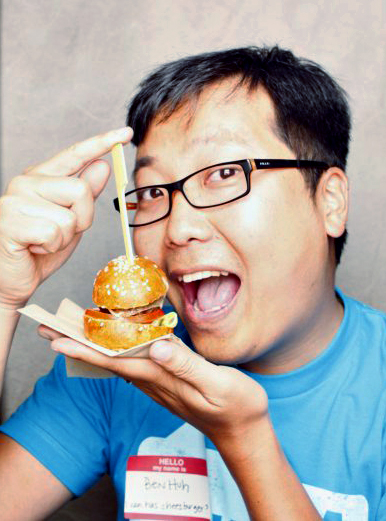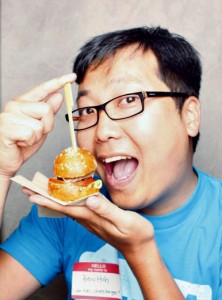Ben Huh, 33, is the owner of the Cheezburger Network, the mighty Internet company that owns “I Can Has Cheezburger?” and “Fail Blog,” among a few dozen other websites. Huh is one of Fast Company’s 100 Most Creative People in Business, and has been featured in Wired Magazine, Time Magazine and The New York Times. Huh was born in South Korea, moved to Hong Kong at age 10, and moved again to California halfway through 9th grade. He switched schools once every year between first grade and 10th grade, attending a mix of international, British and American schools, including Hong Kong International School and Cordova High School in California.
1. There are dozens and dozens of articles and blog posts written about you, but no one ever talks about your international childhood. Is this because you hide it, or because they don’t ask?
[Laughs] No one seems to ask. I’m not really hiding it – if you ask me, I’ll tell you. I think that a lot of people who are raised here are afraid to ask where are you really from. They don’t really have a polite way of saying that. …Or, they don’t think it’s all that relevant.
2. Do you think it’s relevant?
I think it’s very relevant. Oh, absolutely. Your childhood shapes your future in a way you couldn’t possibly understand. …You learn to adapt culturally, and the rate of adaption is much, much faster. You kind of, morph or die.
3. For 10 years, you went to 10 different schools. What was that like?
When you are growing up in a foreign country and you don’t have any friends, you kind of end up relying on yourself a lot. I would just go out and play by myself, and go and hang out with Chinese kids in Hong Kong who didn’t speak English and I would try to learn what they were saying and they would try to learn what the hell I was trying to say.
…You have no understanding that this really isn’t normal. It wasn’t until I got to high school [in California] when my parents wanted to move to San Francisco, and I said, “No. I’m not moving. This is it.” … By the time I reached that point, it was difficult for me to build lasting friendships because I didn’t know any better. But I knew that I had to learn.
4. You recently switched from a Korean citizenship to an American one. Why?
I want to be a part of this country that I’m going to live in, probably for the rest of my life. I can hold on to this identity that used to be who I was, and how I got started, but that doesn’t necessarily match the identity that I have for myself. It’s not that I’m a prototypical Asian-American — I’m not — but this is still closer to who I am than being Korean.
I remember a couple years ago I went to Korean consulate here in Seattle to apply for a renewal of my Korean passport. …One of the questions was, “What’s your address in Korea?” Because if you have a Korean passport, they assume you have an address in Korea. I’m like, crap! I’ve never had an address there. I was a child when I left! I had to call my dad who then looked up my grandparents’ address, and he said, oh, you can put this down. I remember going through that process feeling oddly not Korean.
5. You haven’t been back to Asia since you left. What will you do when you finally get to go back?
I think I’m gonna go eat like a king. [Laughs]. And probably visit all the places that I grew up in, and see how they’ve changed.
6. How has being a Third Culture Kid helped your career?
It’s helped my career significantly, because I can put myself in the shoes of more people than your average person. I’ve been there, done more, seen more, experienced what it’s like to live in ambiguity. And, a lot of business is ambiguous. You don’t know what the outcome is gonna be.
7. How has being a Third Culture Kid hurt your career?
I feel like there’s a part of me that people just will never know, or never understand. And I feel like I missed out on a common history with some people. It goes deep, but it doesn’t go as deep as my core.
When you actually describe Third Culture Kids, even though we’ve never met, even though we’ve never lived in the same place at the same time, and even though most of us have never actually lived in the same countries, there is a connection that builds, knowing that we’ve lived in this ambiguous identity-less world.
8. Why have you succeeded when lots of other Internet companies have failed?
That’s an easy question, isn’t it? [Laughs] I don’t know. I honestly don’t know. I think I’m fortunate to have gotten a really, really good education. …I learned that education was something that I did, not something that was performed on me – so I went out and tried to do more things than your average kid, which got me into Northwestern [University], which gave me a great great starting point. …And I think I was definitely more ambitious, and I was willing to fail in order to succeed later.
9. Now that you own your own company, are you more or less likely to hire a Third Culture Kid?
Oh, totally more. The more exposure to various cultures and experiences you’ve had, you’re more interesting to me. You stand out, absolutely.
10. What advice would you give to a Third Culture Kid who wants to start their own company?
We have a significant advantage. The ability to deal with ambiguity, the ability for us to understand others who are not of the cookie cutter background that we’re used to. …The ability for us to understand international business. A lot of us speak second or third languages. It’s a huge advantage. You can hold those advantages close to your breast or you can come out loud and say, “This is who I am.” Making sure that you’re not ashamed of those advantages is really important.


Cool interview!
As a TCK who’s attempting to launch his own biz, I have the same feelings about being more willing to step into the unknown and try out stuff. It actually excites me to interact with new people from all cultures and industries – I find that it’s pretty easy for me to quickly find common ground with people in the first 1-2 sentences of conversation.
I guess it’s no surprise that TCKs will naturally gravitate to cosmopolitan cities (Amsterdamn/London in Europe, NYC/SF/Toronto in North America).
LikeLike
Awesome interview!! Super inspiring. Its funny, and so true, that TCKs really thrive in ambiguity. To me, the word actually incites feelings of excitement, not intimidation. Great piece!!
LikeLike
Definitely identified with going to the consulate after losing my passport twice one summer, trying my best to read and understand the application in a language I could barely understand, failed, asked for help and felt utterly frustrated and confused, didn’t know my address back “home” where there was none and in the end had to fax the application to my father who was “luckily” in a time zone only 7 hours away!!! So sad! I kept asking if they had it in English, no such luck!
LikeLike